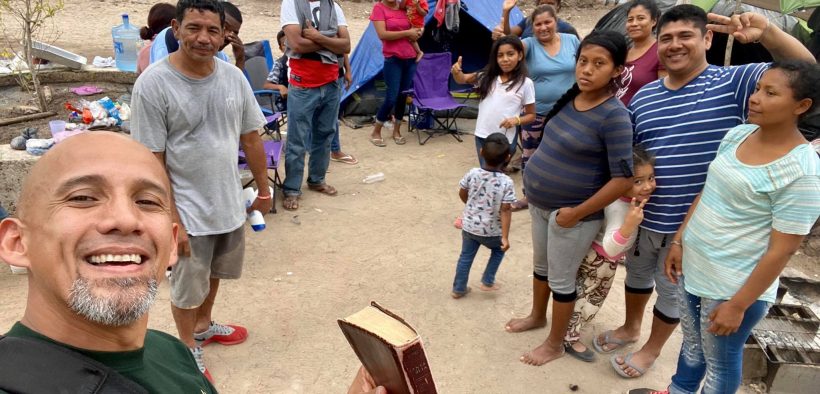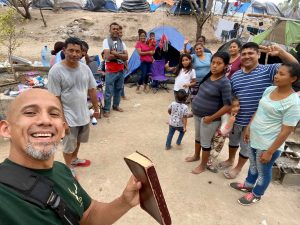The Bridge to Hope
One Mission Ministries provides for the physical and spiritual needs of thousands of asylum seekers waiting to cross into the U.S. in Matamoros, Mexico.

At age 14, Abraham Barberi came to the United States from Mexico as an immigrant. Now 53, Barberi spends his days and nights running One Mission Ministries (OMM), caring for thousands of immigrants seeking asylum at the Mexico/U.S. border in the town of Matamoros.

“I see this as one of the greatest opportunities to be the hands and feet of the Lord,” said Barberi, who was once the trouble-making son of a drug dealer turned converted gang member now turned Christian pastor. “I am about the Great Commission, we always pray to go to the nations—and the nations came to us!”
CBS This Morning followed Barberi on the ground at the Mexican border in March 2021 and got footage of him crossing from his home in Brownsville, Texas, to Matamoros, on his daily trek to charismatically care for asylum seekers. Wearing a bright blue mask, he greeted the immigrants, all waiting for the chance to cross the Brownsville & Matamoros International Bridge (one of the three international bridges between Matamoros and Brownsville, Texas).
For the last five years, Barberi’s day-to-day tasks have included running a church in Metamoros, meeting the physical needs of asylum seekers, delivering food, firewood, and tanks of 50,000 liters of water per day. In addition, Barberi could be seen offering pastoral care to the thousands of immigrants.
Access to MinistryWatch content is free. However, we hope you will support our work with your prayers and financial gifts. To make a donation, click here.
“This is a new thing,” Barberi said. “Around December 2016 was the first time we went to the bridge to help asylum seekers. There were about 10 people gathered seeking asylum and we took them blankets and things to eat. We went back the next day and they had crossed.”
The number doubled from 10 to 20, then quickly grew to 100. “It went all the way to 600 people and eventually to 3,000,” Barberi said. He added that Metamoros has dramatically changed in the last few years. Before 2016, while it was an immigration town, he noted that you would not see immigrants gathered at the International Bridge seeking asylum or even walking around town.
It was during the last two years of the Trump Administration (2019-2020) that the problem exploded, Barberi said, with little hope from the U.S. government to allow asylum seekers across. In addition, the Mexican government is “very difficult to deal with,” Barberi said, and has little motivation to help these individuals.
“Every day was very emotional. We were told that only 1-2 percent were going to cross the border,” Barberi said. “We wondered, what are they going to do? And then there was a time where the Mexican government did not want them there—it was really difficult.”
At the beginning, it was just OMM supplying the asylum seekers with necessities—food, blankets, drinks, toothbrushes, tarps, toiletries—whatever they could, Barberi said. Then, other nonprofits joined the fray and began making deliveries, as well. When the numbers grew to thousands of immigrants gathering at once at the bridge, something had to be done.
“We would bring 1,000 meals at a time and everyone was bringing a little bit of everything and it was a mess,” he said. OMM officially joined forces with five local organizations and also worked with the Mexican and federal governments to create a system to meet asylum seeker’s needs with minimal waste.
“Asylum seekers were using water from the river and getting ill,” Barberi said. “I knew where to get firewood, so our responsibility was to bring in firewood, water, and drinking water. We brought a water tank that allowed us to bring tens of thousands of liters per day as well as jugs of drinking water.”
Other partners would bring in rice, beans, and corn, another organization gathered soap, toilet paper, and toiletries, and another was in charge of medical assistance. But day to day, Barberi’s biggest role was pastoral ministry.
“I would go walk around that camp and listen to people, pray for people. They allowed us to start a church over there and we brought lots of Bibles,” Barberi said. “Most of my advice would be, I think God is going to turn this around and do something supernatural, but if God doesn’t—you have to start creating a plan B. I would say to trust God but to plan.”
An immigrant himself, Barberi said he is specifically fit for the job of empathizing with these individuals and families. Barberi and his mother made their way to Houston, Texas, when he was 14. In Texas, he grew into what he calls “a really bad troublemaker.” A few years later, Barberi said his life was changed when he became a Christian. He attended and graduated from Instituto Biblico Latino, Southwestern Baptist Theological Seminary, and B.H. Carroll Theological Institute. During these years, he visited Metamoros during a missions stint.
“Ever since, my heart stayed in Metamoros,” Barberi said. “It is a hard city with a lot of drugs and alcohol and immigration.” It was nine years before Barberi’s passion saw fruition, roadblocks included logistics with the IMB International Board, who never send nationals back to their home countries. Eventually, he launched OMM as a small nonprofit in 2009 and moved with his wife, Patty, and three (now four) children to Metamoros as an extension of his local church.
“We moved to the border and our main goals are to preach the gospel, plant churches, make disciples, and help the needy. This is our work,” Barberi said.
In addition to helping immigrants, OMM plants and disciples churches across Mexico. OMM has two Bible Institutes—one in El Salvador (where OMM has four churches) and one in Matamoros. Most recently, OMM just started a church plant in Cordoba, Argentina.
Barberi talked about the various reasons people make it to the border, saying that more than 50% are escaping due to some kind of violence.
“There are gangs everywhere with the Cartel in Mexico,” Barberi said. “Some are escaping political persecution or family members, such as women who went through violence with a husband abusing them. More than 50% are escaping some kind of violence or extortion.” Some are escaping poverty, he added, in cities with a total lack of job opportunities. The long trek to the border often includes horrific experiences. Common ones are kidnapping, sexual abuse, and being physically assaulted, Barberi said.
After the Biden Administration launched early this year, Barberi said President Joe Biden promised he was going to work with the NPP cases, a huge number of asylum cases that had been processing since 2019, mostly involving people from Central America. Thankfully, at that time, a large number of asylum seekers were let across into the United States in groups of about 100 per day.
“The day before that was supposed to start, we had a big church service and people could not believe it,” Barberi said, smiling. “They didn’t want to eat anymore, everyone just wanted to go across the border. They were so excited. They were ecstatic. It was a great celebration, a great feeling.”
In February of this year, the Mexican government and U.S. Government closed down the refugee camp; no one was allowed to enter. That’s when Barberi got a phone call from The United Nations High Commissioner for Refugees (UNHCR).
“There were about 60 asylum seekers still waiting. The UNHCR and the US embassy promised to expedite the cases of the remnant of the refugee camp and asked if I could provide them shelter,” Barberi said. With his team, OMM launched a shelter in the OMM Bible Institute. “In two weeks most of them had crossed the border. So, we started taking new arrivals.” As of May 2021, 120 new arrivals live in the OMM shelter.
“Immigration is never going to stop; they are going to keep coming across the border. We are going to keep doing what we are doing, being the hands and feet of the Lord,” Barberi said. OMM plans to keep the shelter open as long as they can. Barberi’s hope is that American Christians would reevaluate their perspective on immigrants.
“At least 50 percent of the residents in the United States have a really bad opinion of asylum seekers and immigrants,” he said. He often gets stopped and asked why he is working “with those illegals.”
While there are some criminals in the bunch, Barberi said that’s largely not the case. “I am sure there are some criminals—they are all over the world. But they are not illegals, they are in Mexico legally. They are trying to get into the U.S. the legal way. They are human beings.”



